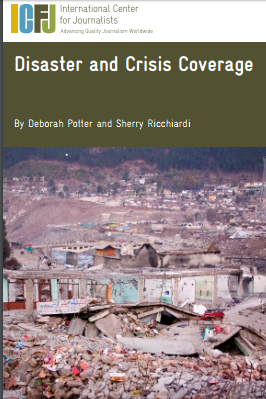
Disaster and Crisis Coverage, a manual for journalists
A disaster is "a critical event that alters the regular order of things". For journalists, a disaster is the kind of breaking news story that merits extensive coverage. Most disasters cannot be accurately predicted but they can be anticipated. By planning ahead, news organizations and individual journalists can provide their communities with better, more thorough coverage. The ICFJ provided journalists with a complete and extendend guide for disaster coverage.
If the newsroom does not already have a disaster plan, this manual offer a step-by-step guide to creating one. Even if a plan exists, this how-to guide may suggest the need to revise it.
Section I provides guidelines for delivering news in a professional manner and maintaining personal safety. Crises often render severe mental and emotional stresses on victims and survivors, the individuals who are often vital sources.
Thus, Section II addresses trauma and offers suggestions helping journalists work with grieving victims and survivors in an ethical, sensitive, and effective manner. This section defines traumatic stress and offers tips to media professionals for their own self-care.
News managers routinely coach their staff on the news gathering process before, during and after a crisis. But another kind of coaching often is ignored: providing moral support to journalists covering catastrophic events. That is relatively new territory for most news organizations.
Journalists have the reputation of being amazingly resilient and dedicated to their work. They also can be stubborn and avoid dealing with their emotions, especially if they think it will make them look weak in the eyes of their bosses or coworkers. This manual provides a starting point for news organizations seeking to deal more efficiently with journalism and traumatic stress.
Tags: Journalism education Ethics of journalismThe content of this article can be used according to the terms of Creative Commons: Attribution-NonCommercial 4.0 International (CC BY-NC 4.0) . To do so use the the wording "this article was originally published on the Resource Centre on Media Freedom in Europe" including a direct active link to the original article page.

